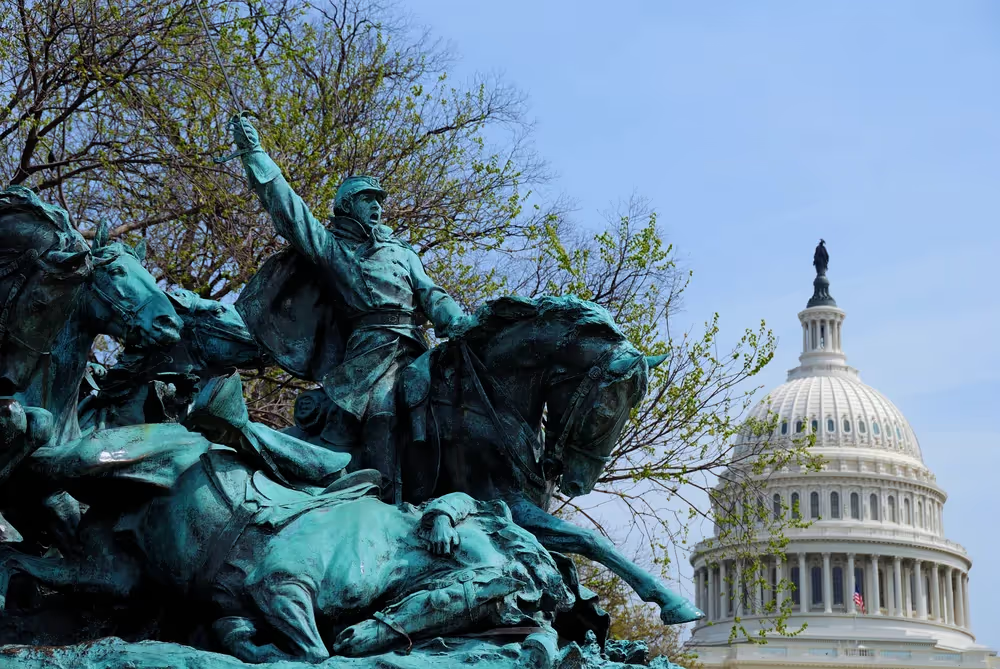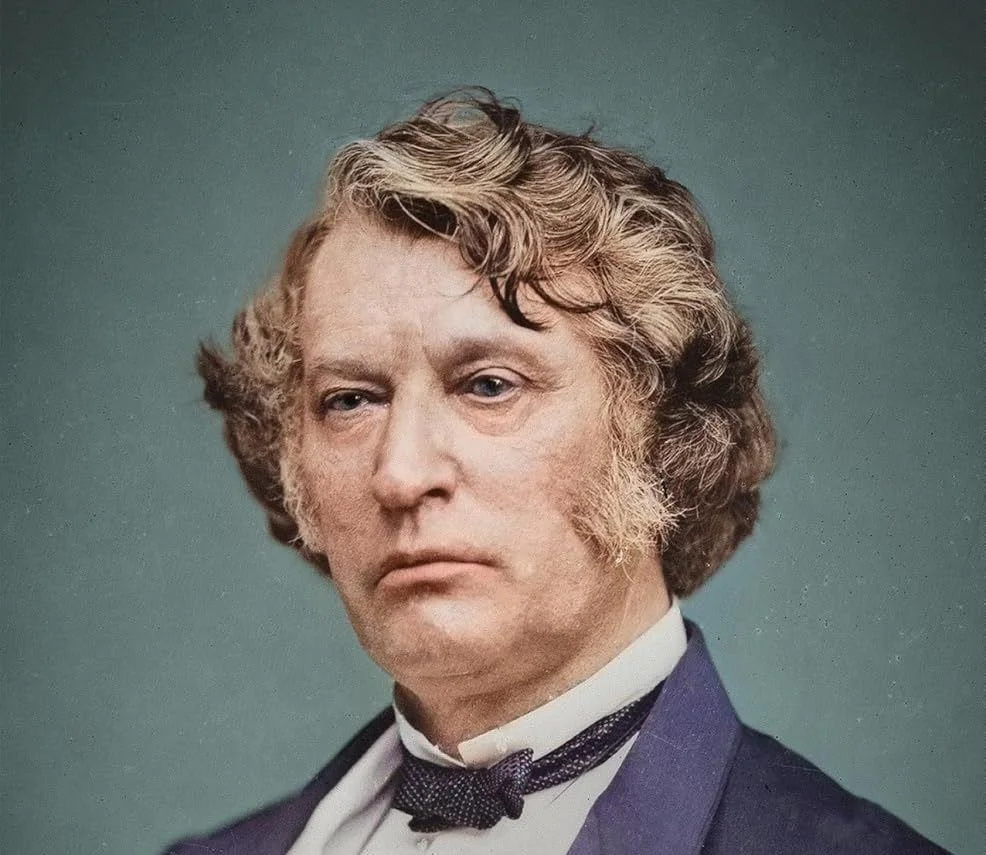
The War Powers and Original Understanding
The Constitution does not give Congress the central authority for waging military hostilities.
Listeners to the LawTalk podcast know that I disagree with my friend and co-host, Richard Epstein, about as much as I agree. Most people cannot even reach the 50 percent threshold in disagreeing with him, but that's because arguing with Richard is so much fun! I write to explain why I disagree with Epstein again, this time regarding war powers. Common sense does not support replacing the way America has waged war throughout our history with a radically different system that mimics the separation of powers for domestic affairs.
In his recent essay for Civitas Outlook, “Donald Trump’s War Against Iran,” Epstein argues that President Trump’s strike on Iran violated the Constitution. He agrees with many liberal constitutional scholars (and not a few conservative ones) that Article I’s vesting of the power to “declare war” in Congress gives it the authority to decide on waging offensive war alone. An “underlying emergency (not of the tariff variety) allows immediate action, at least until Congress can intervene,” Epstein writes. “But for a set piece, a system of implied powers does not work.” The rise of hostile regimes armed with nuclear weapons and intercontinental ballistic missiles, however, requires us to accept a change in our constitutional system that grants more power to the executive. “In light of these events, there is, unfortunately, a built-in obsolescence to the constitutional structure, given that the rapid movement of events makes [a congressional declaration of war] questionable,” he concedes.
Epstein need not base his conclusion that modern technology requires an unwritten amendment to the Constitution that dispenses with Congress’s power over war. His argument relies on a narrow interpretation of the constitutional text and history, which claims an unjustified certainty in the Constitution’s original understanding. Everyone agrees with the basic point that Congress has the constitutional authority to check the President on matters of war. But the important question is how.
The Constitution itself does not give the Declare War Clause the central authority for waging military hostilities. During the last two centuries, neither presidents nor Congress have ever acted under the belief that the Constitution requires a declaration of war before the U.S. can engage in military hostilities abroad. Although this nation has used force abroad more than 100 times, it has declared war only five times: the War of 1812, the Mexican-American and Spanish-American Wars, and World Wars I and II. The record of American military conflicts is notable for the absence, not the presence, of declarations of war by Congress.
Without declarations of war or any other congressional authorization, presidents have sent troops to oppose the Russian Revolution, intervene in Mexico, fight Chinese Communists in Korea, remove Manuel Noriega from power in Panama, and prevent human rights disasters in the Balkans. Other conflicts, such as the Persian Gulf War, and the war in Afghanistan, received “authorization” from Congress but not declarations of war.
Epstein creates a false conflict between the original understanding of the Constitution and the judgment of dozens of Presidents and Congresses on how to wage these wars. If he is right, we must immediately delete Congress’s power to Declare War from the Constitution. Or we must overthrow a durable system that gives presidents the initiative while allowing Congress to influence war through funding and its control over the size and shape of the military. Or we must ask the courts to stop wars that have received no declaration or authorization.
The Constitution does not give Congress the dominant hand in war. Instead, our Framers decided that the President would play the leading role. The Revolutionaries of 1776 indeed rejected the British monarchy, which had enjoyed all powers related to war. Upon independence, the Revolutionaries experimented with weakening the executive branch. But when the Framers wrote the Constitution eleven years later, they restored an independent, unified chief executive with its own powers.
The most important of these powers is to wage war as Commander-in-Chief and Chief Executive. “The direction of war implies the direction of the common strength,” Alexander Hamilton wrote in Federalist 74, “and the power of directing and employing the common strength forms a usual and essential part in the definition of the executive authority.” Hamilton argued that the President should manage war because he could act with “decision, activity, secrecy, and dispatch.” “Energy in the executive is a leading character in the definition of good government,” he observed. “It is essential to the protection of the community against foreign attacks.”
Epstein is right to point to the power to declare war as one of Congress’s most important weapons in its constitutional arsenal. But he misunderstands the function performed by a declaration of war at the time of the Constitution’s adoption. When the Framers wrote and ratified our governing document, a declaration of war was not required to initiate hostilities. Indeed, in the 100 years preceding the Constitution, the British had declared war only once at the outset of a conflict. Declarations define the legal status of hostilities under international law. They don’t give Congress the sole key to launch the missiles.
Our Constitution makes clear when it requires a specific process before the government can act, especially when the executive and legislative branches share power. It sets out detailed procedures for the passage of laws, the appointment of Supreme Court Justices, and the making of treaties. There are no such procedures for war. Article I, Section 10 provides a strong counterpoint to assuming that “declare war” means authorizing hostilities. That provision requires states to seek congressional approval before fighting a war. It states: “No State shall, without the Consent of Congress . . . engage in War, unless invaded, or in such imminent Danger as will not admit of delay.” Here is the exact war-making system that Epstein believes applies between the President and Congress. The President must have the consent of Congress before engaging in war. Section 10 even has an explicit exception for imminent attacks that all scholars admit must implicitly fall within the Declare War Clause. Epstein cannot explain why the Framers did not use this same provision and substitute “President” for “State.” If we follow Chief Justice John Marshall’s rule of interpretation in McCullough v. Maryland that the same words in the Constitution have the same meaning, and different words must carry different meanings, we must conclude that the division of the power to Declare War from the executive power creates a different structure than the simplistic Congress decides on war and then the President wages it.
Instead of demanding a legalistic process to initiate war, the framers left the decision to wage war to the discretion of politics. They granted war powers to both the President and Congress, allowing them to either cooperate or contest for primacy over war policy. The Constitution creates a presidency that can respond forcefully to prevent serious threats to our national security. Presidents can take the initiative, and Congress can use its funding power to check them. If Presidents lead the nation into disastrous mistakes, Congress can impeach them, and the people can reject them at the ballot box.
If Congress feels it has been misled in authorizing war or disagrees with the President’s decisions, all it needs to do is cut off funds, either all at once or gradually. It can reduce the size of the military, shrink or eliminate units, or freeze its supplies. Congress successfully ended the war in Vietnam by cutting off funds; it similarly used the power of the purse to halt President James Polk’s designs to occupy all of Mexico.
However, Presidents and Congresses have never acted under the belief that Congress’s Article I powers grant it control over tactics and strategy. Congress’s real power is its power of the purse, not any right to dictate which units should fight when or where. Congress is too fractured, slow, and inflexible to effectively micromanage military decisions that require speed, secrecy, and force. Even when it has access to the same intelligence as the executive branch, Congress’s loose, decentralized organization would likely paralyze American policy as foreign threats escalate.
A careful review of the debates over the ratification of the Constitution supports this reading of the text and structure. When the Framers argued over their expectations for executive and legislative struggles over war, the Federalists never raised the Declare War Clause as a limitation on the Executive. Instead, they predicted that Congress’s power over funding would serve as the primary control. The most direct confrontation over the issue occurred at the Virginia ratifying convention, which was probably the most politically significant state in the ratification struggle. Patrick Henry, leader of the Virginia Anti-Federalists, argued that the President would use his command over the military to lead the nation into disastrous adventures. Federalists did not respond with Congress’s power to declare war as a check on the Executive. Instead, they hearkened to the traditional legislative control over executive war-making through the power of the purse. Federalist George Nicholas replied to Henry that: “The President is to command. But the regulation of the army and navy is given to Congress. Our Representatives will be a powerful check here. The influence of the Commons in England in this case is very predominant.”
Henry responded that the proposed constitution violated the maxim that the purse and sword ought to rest in the same government. But James Madison defended the Constitution on the ground that the maxim meant “that the sword and purse are not to be given to the same member.” Under the British constitution, Madison argued, “The sword is in the hands of the British King. The purse is in the hands of the Parliament. It is so in America, as far as any analogy can exist.” Madison, who would oppose President Washington’s power to issue the Neutrality Proclamation, explicitly relied on the Legislature’s power to fund and raise the military as a check on the Executive’s war powers. In the critical state of the ratification process where the Constitution almost failed (Virginia ratified by only an 88-80 vote), Madison did not raise the Declare War Clause as a check on the President’s war powers. He relied solely on the legislature’s funding power as a check on the executive, which was the great lesson of British constitutional history familiar to all the Framers.
There are, of course, instances when the original understanding of the Constitution conflicts with the government's historical practice. Unlike Epstein, I would enforce the clear meaning of the constitutional text as understood by the Framers at the ratification. But war powers do not require us to make this choice. The original understanding does not support the view that the nation cannot wage war abroad without congressional authorization. Instead, it creates a flexible, fundamentally political process within which the branches can use their constitutional powers to advance their policies. As we confront the return of great power politics and rivals armed with weapons of mass destruction, now is not the time to introduce sweeping, untested changes in the way we make war.
John Yoo is a senior research fellow at the Civitas Institute, and a distinguished visiting professor at the School of Civic Leadership at the University of Texas at Austin. He is also the Emanuel Heller Professor of Law at the University of California at Berkeley where he supervises the Public Law and Policy Program among other programs at Berkeley Law.
Constitutionalism

Amicus Brief: Hon. William P. Barr and Hon. Michael B. Mukasey in Support of Petitioners
Former AGs Barr and Mukasey Cite Civitas in a SCOTUS Brief

Rational Judicial Review: Constitutions as Power-sharing Agreements, Secession, and the Problem of Dred Scott
Judicial review and originalism serve as valuable commitment mechanisms to enforce future compliance with a political bargain.

Supreme Court showdown exposes shaky case against birthright citizenship
Supreme Court will hear challenges to Trump's order ending birthright citizenship, testing the 14th Amendment's guarantee for babies born in America.

Slavery and the Republic
As America begins to celebrate its semiquincentennial, much ink has been spilled questioning whether that event is worth commemorating at all. Joseph Ellis’s The Great Contradiction could not be timelier.

Two Hails For The Chief’s NDA
Instead of trying to futilely plug the dam to stop leaks, the Court should release a safety valve.


.avif)










.avif)



